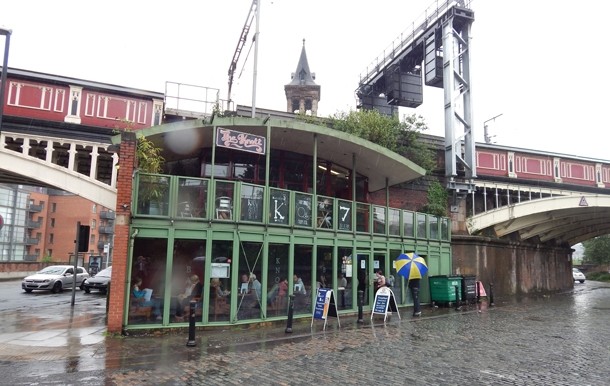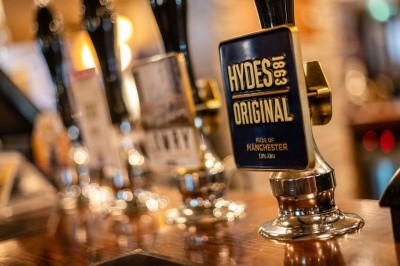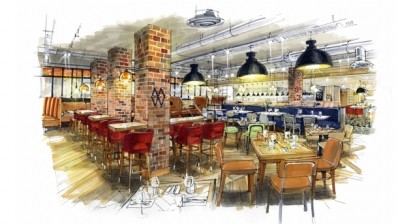Protz
Manchester: A city united in brewing beer

A trip to Manchester for a beer lover used to mean only one thing: “A pint of Boddies”. Boddies was short for Boddingtons and the much over-used term “iconic” was surely coined for the family brewery and its straw-coloured bitter that made exiled Mancunians weep.
Back in the ’70s and ’80s, Manchester still had several family breweries, including Holt’s, Hydes, Lees and Wilsons.
Remarkably, the first three are still around but, fine though their beers are, it was Boddingtons that ruled the roost and won acclaim for the sheer liquid poetry of a bitter that zinged with unashamed hop and juicy malt character.
Boddingtons
I once wrote that the first time I tasted Boddingtons Bitter in a pub in Hyde on the fringe of Manchester I refused to leave on the grounds that I didn’t think beer could be that good. It was a legend. In 1969, when Allied Breweries mounted a takeover for Boddingtons, one shareholder said the bid came from a company best known for Double Diamond keg and Skol lager brands “that were full of wind and p***, like a barber’s cat”.
That’s rather unfair on the average, well-meaning barber’s cat, but the point was well made. Allied Breweries was rebuffed but then Whitbread came calling and eventually bought Boddingtons in 1989. At first all seemed well.
Boddies was rolled out nationwide with the slogan “the cream of Manchester” and keg and canned versions became major exports.
Strangeways
But in 2000, Whitbread left brewing and its brands fell to what is now known as AB InBev. Even though Boddington’s Strangeways brewery could produce close to 800,000 barrels a year, that was — if you’ll pardon the pun — small beer for the maker of Budweiser and Stella Artois.
Strangeways was closed in 2004. The cask version of Boddington’s Bitter was brewed under contract by Hydes for a few years but was eventually discontinued. The legend died.
But you can’t keep good beer down. Earlier this month, Manchester Beer Week celebrated the blossoming of brewing in the city and the wider county, with a dozen breweries in central Manchester and 60 in Greater Manchester. Frustratingly, on the Saturday of the beer week, when I paid a visit, torrential rain drowned an open-air celebration of brewing in Exchange Square. But there was still much to see, drink and admire.
Marble
That old song Underneath the Arches could be the theme for the revival of brewing in the area. One of the earliest craft breweries, Marble, moved out of the splendidly traditional Marble Arch pub on Rochdale Road and is now under railway arches a few yards away where it brews excellent organic beers, including the stunning Earl Grey IPA.
I had lunch — both solid and liquid — in the Knott opposite Deansgate Station. This is also under both train and tram lines and is a model of a modern, vibrant bar that’s bistro-cum-pub.
It’s a sign of the times that the Knott has been named local CAMRA Pub of the Year in 2010, 2012 and 2015: anyone who thinks the Campaign for Real Ale is past its sell-by date should think again, for the award has gone to a bar that serves not only cask beer but modern craft keg beers as well.
Brewsmith
I had an excellent three-bean chilli washed down by a pint or two of Centennial IPA from Brewsmith in Ramsbottom, run by James, Jennifer and Ted Smith. The IPA was specially brewed for the beer week and is an American version of the style, rich with fruity Centennial hops.
I’d hoped to drop into one of the latest new breweries in Manchester, Beer Nouveau, but time and the downpour put a stop to this. It’s also in old railway buildings in — would you believe it — Temperance Street. Owner Steve Dunkley plans to not only brew beer, but also to open a tap room and invite keen would-be brewers to make their own beers in his kit.
Dunkley also pays homage to the history of the area with two beers called Marx and Engels. Karl Marx was based in London but he would frequently visit Fred Engels, his benefactor and co-author of The Communist Manifesto, in Manchester. While plotting the downfall of capitalism, they would help boost the profits of local brewers by sinking a pint or three.
Tap
So my final watering hole — a precise description, given the weather — was the Piccadilly Tap, a few steps from the main railway station. This is another modern bar, open-plan, with beer served from taps set in the wall linked to a cool store behind.
Again, there’s a good mix of both cask and keg, with much local representation plus, on my visit, Adnams of Suffolk putting in an appearance.
You can buy bottles for drinking on the train home. They certainly know how to please visitors to Manchester and put a smile on the face of a barber’s cat.




